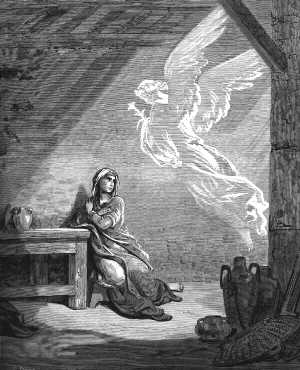Yesterday I wrote that, in Karyn Henley’s Angelaeon Circle, God is not really God and the angels are not really angels. Chawna Schroeder and Julie Bihn wrote similar criticisms, going into Scripture to show the difference between Karyn Henley’s angels and God’s.
Becky Miller wrote that the angels in the Angelaeon Circle are invented beings who should not be taken as representative of true angels. She also pointed out that the debate about which fantasy novels are Christian includes works as respected as Lord of the Rings.
We all would agree that, in telling and enjoying stories, Christians have broad creative license. New worlds with strange races and different natural laws – that is permitted. The question is this: What sort of creative license do we have in portraying God and angels in these speculative worlds?
I will take the question regarding God first, because it is more important and also easier to answer. Whenever Christians write of God – even in fantasy worlds – everything they write must be true. There’s enough room in this universe to imagine a thousand different planets and races, but there is not room enough to imagine a different God.
I don’t think that every Christian fantasy has to bring God into the picture. But if any does, it must be true to Scripture. Silence is better than a false portrayal. In the Angelaeon Circle, everyone acknowledges that the Most High exists – and usually acts as if it doesn’t matter. Even the angels rarely take him into account. A story like Lord of the Rings, where the heroes don’t talk about God, is more Christian than a story where the heroes treat Him as negligible.
As for the angels, I wouldn’t lay down an absolute principle there. Some reviewers have been bothered by Karyn Henley’s unbibl ical angels, some haven’t been, and I understand and respect both positions. Each to his own conscience and his own judgment.
ical angels, some haven’t been, and I understand and respect both positions. Each to his own conscience and his own judgment.
But it might clarify things if writers would decide at the beginning whether they really want angels. Do they want holy, celestial beings who do not marry, die, or procreate? If the answer is yes, then they should portray angels as they are.
If the answer is no, and what they really want is beings who are only sort of like angels, then they should invent a new race and a name for them to go by. After all, if it doesn’t walk like a duck, and it doesn’t quack like a duck, and it doesn’t look like a duck – why call it a duck?

I agree with you on your comments about God, Shannon. It’s hard to see a being referred to as the Most High and not believe that means God.
Angels, though, I don’t think the duck illustration works because of the creative license you mention in the title of your post. Take dragons, for instance. In Scripture Satan is the dragon who was the Serpent of old. There’s a very credible description of a dragon in the book of Job. Yet Donita Paul turns dragons int cute cuddly friends with all kinds of helpful qualities. No one seems disturbed by her portrayal. Is this because we are less aware that the dragon is Biblical?
I don’t know.
If this were my story, I would have named my beings something else, but I don’t think the fact that Ms. Henley chose otherwise necessarily needs to be a strike against it.
Good discussion. I’ve appreciated what you, Julie, and some of the others have had to say on the subject.
Becky
You wrote: “A story like Lord of the Rings, where the heroes don’t talk about God, is more Christian than a story where the heroes treat Him as negligible.”
Awesome line.
The ultimate disrespect, I think, is not from the folks who are actively engaging with God — even those who are angry with Him or fighting against Him — but from those who say He exists, even say He lives in their hearts, but behave as if He is unnecessary or too weak to help them.
As Jesus said about the Pharisees (quoting Isaiah): “These people honor me with their lips, but their hearts are far from me.” Sometimes the right words only make the wrong actions worse.
Thanks for coming by, Keanan.
You know, Becky, the angels stirred more discussion than I would have thought. I don’t feel strongly on the issue, though I think that Karyn Henley’s “angels” were so wide of the mark it would have been better if she gave them another name.
You’re right: Donita Paul’s dragons aren’t much like the fierce animal God describes in Job. For that matter, Bree in The Horse and His Boy isn’t much like the horse God also describes in Job. But most Christians aren’t sensitive about the portrayal of either.
Angels, though, are a touchier matter, and I think there’s good reason for it. The existence of angels, and their nature, is a Christian teaching. There are many false ideas about angels floating around, and some are dangerous. The Bible warns against people who worship angels and who slander them.
There is a theologically correct position on angels; there is not a theologically correct position on dragons. Dragons may not be cuddly, just as horses don’t talk. But Christianity does not make a religious point of those facts.
All this is not to say that we must never use the term “angel” except with absolute biblical accuracy; it just explains the wariness many Christians feel in the matter.